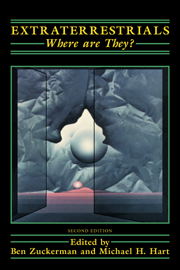Book contents
- Frontmatter
- Contents
- Preface to the Second Edition
- Preface to the First Edition
- 1 An Explanation for the Absence of Extraterrestrials on Earth
- 2 One Attempt to Find Where They Are: NASA's High Resolution Microwave Survey
- 3 An Examination of Claims that Extraterrestrial Visitors to Earth Are Being Observed
- 4 The Likelihood of Interstellar Colonization, and the Absence of Its Evidence
- 5 Pre-emption of the Galaxy by the First Advanced Civilization
- 6 Stellar Evolution: Motivation for Mass Interstellar Migrations
- 7 Interstellar Propulsion Systems
- 8 Interstellar Travel: A Review
- 9 Settlements in Space, and Interstellar Travel
- 10 Terraforming
- 11 Estimates of Expansion Timescales
- 12 A Search for Tritium Sources in Our Solar System May Reveal the Presence of Space Probes from Other Stellar Systems
- 13 Primordial Organic Cosmochemistry
- 14 Chance and the Origin of Life
- 15 The RNA World: Life before DNA and Protein
- 16 The Search for Extraterrestrial Intelligence
- 17 Alone in a Crowded Universe
- 18 Possible Forms of Life in Environments Very Different from the Earth
- 19 Cosmological SETI Frequency Standards
- 20 Galactic Chemical Evolution: Implications for the Existence of Habitable Planets
- 21 The Frequency of Planetary Systems in the Galaxy
- 22 Atmospheric Evolution, the Drake Equation and DNA: Sparse Life in an Infinite Universe
- About the Editors and Contributors
- Author Index
- Subject Index
3 - An Examination of Claims that Extraterrestrial Visitors to Earth Are Being Observed
Published online by Cambridge University Press: 20 October 2009
- Frontmatter
- Contents
- Preface to the Second Edition
- Preface to the First Edition
- 1 An Explanation for the Absence of Extraterrestrials on Earth
- 2 One Attempt to Find Where They Are: NASA's High Resolution Microwave Survey
- 3 An Examination of Claims that Extraterrestrial Visitors to Earth Are Being Observed
- 4 The Likelihood of Interstellar Colonization, and the Absence of Its Evidence
- 5 Pre-emption of the Galaxy by the First Advanced Civilization
- 6 Stellar Evolution: Motivation for Mass Interstellar Migrations
- 7 Interstellar Propulsion Systems
- 8 Interstellar Travel: A Review
- 9 Settlements in Space, and Interstellar Travel
- 10 Terraforming
- 11 Estimates of Expansion Timescales
- 12 A Search for Tritium Sources in Our Solar System May Reveal the Presence of Space Probes from Other Stellar Systems
- 13 Primordial Organic Cosmochemistry
- 14 Chance and the Origin of Life
- 15 The RNA World: Life before DNA and Protein
- 16 The Search for Extraterrestrial Intelligence
- 17 Alone in a Crowded Universe
- 18 Possible Forms of Life in Environments Very Different from the Earth
- 19 Cosmological SETI Frequency Standards
- 20 Galactic Chemical Evolution: Implications for the Existence of Habitable Planets
- 21 The Frequency of Planetary Systems in the Galaxy
- 22 Atmospheric Evolution, the Drake Equation and DNA: Sparse Life in an Infinite Universe
- About the Editors and Contributors
- Author Index
- Subject Index
Summary
Many members of the general public, and some academic scientists as well, maintain that at least some UFO sightings result from the activities of extraterrestrial visitors. Recent polls show that approximately 57% of the public believes that UFOs are ‘something real’ as opposed to ‘just people's imagination’. The figure rises to 70% belief for those who are less than 30 years old (Gallup, 1978), and have thus lived their entire lives in the age of television. UFO belief is not found predominantly only among the uneducated. A 1979 poll of its readers by Industrial Research and Development magazine shows that 61% believe that UFOs ‘probably or definitely exist’, a figure that rises to over 80% for those applied scientists and engineers under age 26. ‘Outer space’ is the most widely held explanation of their origin.
It is obviously true that even if the reality of UFOs were somehow to be fully established, it would not prove the reality of extraterrestrial visitors. UFOs could possibly be, for example, some poorly understood atmospheric phenomenon, or the result of some secret terrestrial technology, or even a life form or natural phenomenon which lies totally beyond the scope of present-day science. But in the public mind, the subject of UFOs is inextricably linked with the idea of extraterrestrial intelligent life, and since ETI is the subject matter of this book, I shall henceforth adopt the popular usage of terms, and examine UFO reports in the context of the evidence they purport to contain concerning extraterrestrial visitors.
- Type
- Chapter
- Information
- ExtraterrestrialsWhere Are They?, pp. 20 - 28Publisher: Cambridge University PressPrint publication year: 1995



